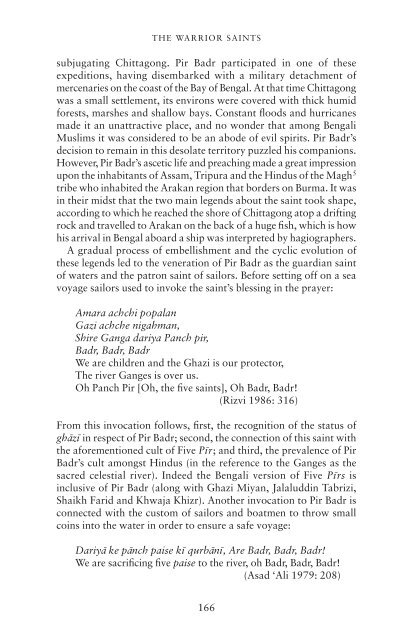Muslim Saints of South Asia: The eleventh to ... - blog blog blog
Muslim Saints of South Asia: The eleventh to ... - blog blog blog
Muslim Saints of South Asia: The eleventh to ... - blog blog blog
Create successful ePaper yourself
Turn your PDF publications into a flip-book with our unique Google optimized e-Paper software.
THE WARRIOR SAINTS<br />
subjugating Chittagong. Pir Badr participated in one <strong>of</strong> these<br />
expeditions, having disembarked with a military detachment <strong>of</strong><br />
mercenaries on the coast <strong>of</strong> the Bay <strong>of</strong> Bengal. At that time Chittagong<br />
was a small settlement, its environs were covered with thick humid<br />
forests, marshes and shallow bays. Constant floods and hurricanes<br />
made it an unattractive place, and no wonder that among Bengali<br />
<strong>Muslim</strong>s it was considered <strong>to</strong> be an abode <strong>of</strong> evil spirits. Pir Badr’s<br />
decision <strong>to</strong> remain in this desolate terri<strong>to</strong>ry puzzled his companions.<br />
However, Pir Badr’s ascetic life and preaching made a great impression<br />
upon the inhabitants <strong>of</strong> Assam, Tripura and the Hindus <strong>of</strong> the Magh 5<br />
tribe who inhabited the Arakan region that borders on Burma. It was<br />
in their midst that the two main legends about the saint <strong>to</strong>ok shape,<br />
according <strong>to</strong> which he reached the shore <strong>of</strong> Chittagong a<strong>to</strong>p a drifting<br />
rock and travelled <strong>to</strong> Arakan on the back <strong>of</strong> a huge fish, which is how<br />
his arrival in Bengal aboard a ship was interpreted by hagiographers.<br />
A gradual process <strong>of</strong> embellishment and the cyclic evolution <strong>of</strong><br />
these legends led <strong>to</strong> the veneration <strong>of</strong> Pir Badr as the guardian saint<br />
<strong>of</strong> waters and the patron saint <strong>of</strong> sailors. Before setting <strong>of</strong>f on a sea<br />
voyage sailors used <strong>to</strong> invoke the saint’s blessing in the prayer:<br />
Amara achchi popalan<br />
Gazi achche nigahman,<br />
Shire Ganga dariya Panch pir,<br />
Badr, Badr, Badr<br />
We are children and the Ghazi is our protec<strong>to</strong>r,<br />
<strong>The</strong> river Ganges is over us.<br />
Oh Panch Pir [Oh, the five saints], Oh Badr, Badr!<br />
(Rizvi 1986: 316)<br />
From this invocation follows, first, the recognition <strong>of</strong> the status <strong>of</strong><br />
ghāzī in respect <strong>of</strong> Pir Badr; second, the connection <strong>of</strong> this saint with<br />
the aforementioned cult <strong>of</strong> Five Pīr; and third, the prevalence <strong>of</strong> Pir<br />
Badr’s cult amongst Hindus (in the reference <strong>to</strong> the Ganges as the<br />
sacred celestial river). Indeed the Bengali version <strong>of</strong> Five Pīrs is<br />
inclusive <strong>of</strong> Pir Badr (along with Ghazi Miyan, Jalaluddin Tabrizi,<br />
Shaikh Farid and Khwaja Khizr). Another invocation <strong>to</strong> Pir Badr is<br />
connected with the cus<strong>to</strong>m <strong>of</strong> sailors and boatmen <strong>to</strong> throw small<br />
coins in<strong>to</strong> the water in order <strong>to</strong> ensure a safe voyage:<br />
Dariyā ke pānch paise kī qurbānī, Are Badr, Badr, Badr!<br />
We are sacrificing five paise <strong>to</strong> the river, oh Badr, Badr, Badr!<br />
(Asad ‘Ali 1979: 208)<br />
166


